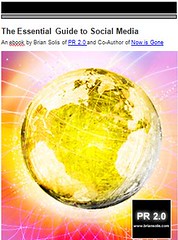Defining Social Media

After publishing, "The Future of Communications - A Manifesto for Integrating Social Media into Marketing," I decided to take a short break. I wanted it to reside online for people to discover before it was pushed down the page with every post to follow. Afterall, we do have a very short attention span these days and the important posts that exist across the blogosphere are unfortunately quickly forgotten.
But that's the point of the manifesto. There are conversations taking place across multiple networks, and each are vying for our attention, which increasingly thins with every new network, app, and tool that's introduced.
So, how do we ensure that conversations don't leave us behind?
We engage and continually participate.
There has been a fundamental shift in our culture and it has created a new landscape of influencers and an entirely new ecosystem for supporting the socialization of information – thus facilitating new conversations that can start locally, but have a global impact.
Social Media is, at its most basic sense, a shift in how people discover, read, and share news and information and content. It's a fusion of sociology and technology, tranforming monologue (one to many) into dialog (many to many.)
It is an evolving phenomenon that has captivated some, intrigued others, and is feared and underestimated by many. But if you're new to this discussion, where do you go to learn about the basis for Social Media or simply its definition? The current "go to" reference is Wikipedia, and as I mentioned in previous posts, it is misleading, incomplete, and uninformative.
There are many of us who have spent the last year defining and defending Social Media as a legitimate classification for new media as well as documenting the tools that facilitate the socialization of content, including Stowe Boyd, Robert Scoble, Jay Rosen, Chris Heuer, Jeremiah Owyang, Shel Israel, Todd Defren, Brian Oberkirch, Chris Saad, Jerry Bowles, Deb Schultz, Marianne Richmond, JD Lasica, Rohit Bhargava, Jeremy Pepper, Greg Narain, et al. However, we always seem to run around in circles defining it and re-defining it, over and over again.
I originally stated that the Wikipedia definition was in dire need of reform, otherwise we're doomed to continually run through these cycles of explanation and defense, instead of focusing on foward-thinking, collaboration, and development. A more informative and clearer definition will benefit those new to the conversation as well as strengthening and uniting the effort of those visionaries who will continue to carry the flag forward.
The time is now to define social media and I would like to invite those part of the bigger conversation to contribute to the common collective.
Here is the current definition on Wikipedia:
Social media describes the online technologies and practices that people use to share opinions, insights, experiences, and perspectives.Social media can take many different forms, including text, images, audio, and video. These sites typically use technologies such as blogs, message boards, podcasts, wikis, and vlogs to allow users to interact. A few prominent examples of social media applications are Wikipedia (reference), MySpace (social networking), Gather.com (social networking),YouTube (video sharing), Second Life (virtual reality), Digg (news sharing), Flickr (photo sharing) and Miniclip (game sharing).
----
I took the current description and offered some suggestions based on my beliefs as well as points from other thought leaders. I tried to keep it simple as not to overwhelm, but embrace those read it.
1 - social media describes the online tools that people use to share content, profiles, opinions, insights, experiences, perspectives and media itself, thus facilitating conversations and interaction online between groups of people. These tools include blogs, message boards, podcasts, micro blogs, lifestreams, bookmarks, networks, communities, wikis, and vlogs.
A few prominent examples of social media applications are Wikipedia (reference), MySpace and Facebook (social networking), Twitter and Jaikue (presence apps), YouTube (video sharing), Second Life (virtual reality), Upcoming (Events), Digg and Reddit (news aggregation), Flickr and Zooomr (photo sharing), Blogtv, Justin.tv, and Ustream (livecasting), Stickham, YourTrumanShow (episodic online video), Izimi and Pownce (media sharing), del.icio.us (bookmarking) and World of Warcraft (online gaming).
2 - Social Media is the democratization of content and the understanding of the role people play in the process of not only reading and disseminating information, but also how they share and create content for others to participate. It is the shift from a broadcast mechanism to a many-to-many model, rooted in a conversational format between authors and people.
---
I invite your feedback and encourage you to help continue the conversation. My goal is to take a draft of the collective input and submit it to Wikipedia for a more global review.
Additional Resources:
My previous post on Social Media and why it is a legitimate category
Doc Searls and Robert Scoble join me in the conversation about Social Media
Stowe Boyd on Social Media
Chris Heuer on the importance of Social Media
Stowe Boyd and Greg Narain on social terminology
wikipedia definition conversational conversation pr2.0 pr+2.0 pr 2.0 web media 20 media+2.0 manifesto public+relations marketing advertising briansolis twitter jaiku tumblr microblog brian+solis social+media social socialmedia secondlife second+life tools democracy jay+rosen futureworks ustream veodia livecast video socialmediaclub












15 Comments:
About 3 months ago, when the tempest was brewing on defining Social Media, I wrote a post and invited people to edit the Social Media Club Wiki page so we could get there together. There were a lot of good criticism, but no one really logged in to modify it for some reason. I invite you after the conversation to use this as your base - http://socialmediaclub.pbwiki.com/WhatIsSocialMedia
Upon deeper consideration, I think I have an even simpler definition I would like to propose, very much in the spirit of what you have posted here.
Social Media is a broad term that represents the tools and processes by which we connect and communicate online with other people to share conversations, stories, insights, information and experiences.
Maybe as I approach marriage I am just trying to uncomplicate my life, but that feels a bit more soothing to me...
Looking at your list, it seems a little odd (given stereotypical gender attributes) that women are apparently so uninvolved in the business of "defining and defending Social Media". Or maybe they're too busy using and doing to spend time defining it? Either way, I know what your next question is - how about Anne Zelenka, Danah Boyd, Susan Mernit, Kathy Sierra or Tara Hunt? They might not VCs or Sillicon Vally fixtures but they're all people out there doing the work you're talk about.
Oh, and my own little contribution to a definition comes from some reflecting I've been doing about expertise - expertise is accountable in the context of social media. And perhaps more useful as a result of this, as any socially mediated means of distribution makes the consumer of expertise equally accountable for the uses they put it to. Well, that’s my optimistic take on it, anyway. (Feels kind of lame quoting myself, mind).
In terms of "Social Media Services", have you tried Hictu? It's like twitter but you can make audio and video posts also. Chek it out: www.hictu.com
Thank you very much for sharing your thoughts. It is always great pleasure to read your posts.
I like what you are trying to do, but am not sure the the nuance of capitalization effectively separates "social media" from "Social Media."
Perhaps you should use a broader social media definition and define the tools and applications as just that ... tools and applications.
One more question to ask here is whether "online" is an appropriate sole descriptor. Do you consider mobile marketing an element of social media?
Nice post. What are your thoughts about the idea that social media is the new [perfect] platform to facilitate self expression. This applies to consumers as well as publishers, brands, corporations, etc.
With all due respect to the people who have spent time noodling on this, the definitions you all offer are far too complicated.
In discovering there was no universally agreed-upon definition and Wikipedia is a mess about it, I posted a simple and accurate definition on my blog at blog.isabelhilborn.com:
Social Media: Any communications format where the users publish the content.
I think if you get down in the weeds talking about tools (which is really social software), multi-media (that's a given because all media is multi-media), etc. is just making it hard for the layperson to understand.
Why do you use the word "online"? I would include SMS in a social media toolbox, and I think of mobile phones as NOT online.
The growth of mobile as a platform--from uploading pictures from a telephone, sending to others, commenting to one or to many--changes how we communicate, for example regarding length and frequency.
i too am for simplifying this definition. my verion?
"social media describes the digital experiences in which people share."
i dont think social media is/should be confined to "tools" and i think to try to identify everything that people share online will only result in missing something. it's just everything. people sharing whatever the hell they want. and doing so on multiple platforms. not just tools, web or handhelds.
Hey Brian,
isn't wour definition the one for Web2.0? How would you define Web2.0?
What about Wikipedias new definition?
http://en.wikipedia.org/wiki/Social_media
Another nice definition of social media (from wikipedia): Andreas Kaplan and Michael Haenlein define social media as "a group of Internet-based applications that build on the ideological and technological foundations of Web 2.0, and that allow the creation and exchange of user-generated content" (Kaplan Andreas M., Haenlein Michael, (2010), Users of the world, unite! The challenges and opportunities of social media, Business Horizons, Vol. 53, Issue 1, p. 59-68.)
That definition is helpful, but far too complex the mainstream.
http://www.briansolis.com/2010/01/defining-social-media-the-saga-continues/
It's been some time, but your definition still stands?
I think so...
:)
More here:
http://bit.ly/8EzzRW
Post a Comment
<< Home